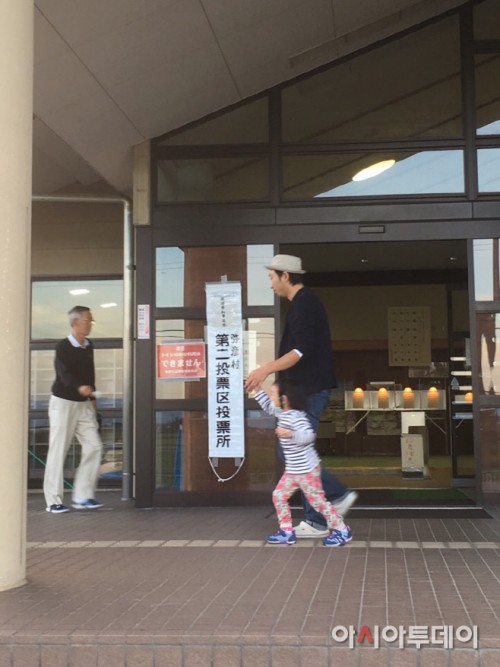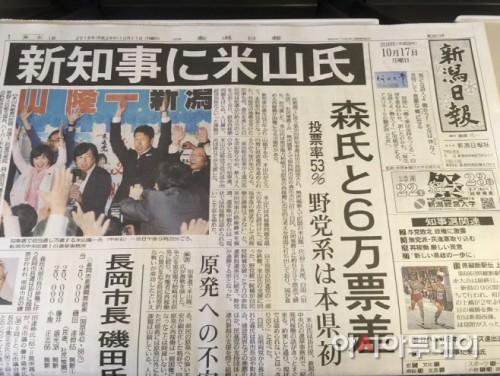 The Niigata gubernatorial election was carried out on October 16. The photo shows the residents of Niigata after casting a vote./ Photographed by Um Soo-ah The Niigata gubernatorial election was carried out on October 16. The photo shows the residents of Niigata after casting a vote./ Photographed by Um Soo-ah |
By Um Soo-ah, Tokyo correspondent, AsiaToday - Japan's Niigata prefecture has recently received national attention due to its governor election on Oct. 16. The 49 year-old independent and anti-nuclear candidate Ryuichi Yoneyama has been elected as the governor of the Japan's Niigata prefecture. Yoneyama has had the support of the Japanese Communist Party and the Social Democratic Party, and won with 53.2 percent of the vote against rival 67-year-old Tamio Mori, who was backed by Abe's ruling coalition.
This is the first time in this region for a candidate backed by opposition parties such as the Communist Party to be elected governor. Four candidates ran for the poll, but eventually Yoneyama emerged victorious in a virtual one-on-one contest against Mori, a former mayor of Nagaoka in the prefecture. Both candidates confronted with each other over restarting the Kashiwazaki-Kariwa nuclear plant, which was shut down after the Fukushima nuclear accident in 2011.
If Mori were elected, there was a high possibility of restarting the nuclear plant. Japanese Prime Minister Shinzo Abe and the ruling Liberal Democratic Party were seeking to have Japan's idled nuclear reactors brought back online, and Tokyo Electric Power Co. expressed its will to restart.
 Local newspaper Niigata Daily News covered the news of new Niigata governor on the front page on Monday, a day after the Niigata prefecture gubernatorial election. Local newspaper Niigata Daily News covered the news of new Niigata governor on the front page on Monday, a day after the Niigata prefecture gubernatorial election. |
The outcome is a manifestation of the strong anxiety that Niigata prefecture residents have concerning nuclear power. A resident that I met near Tsubame Sanjo Station said, "I voted for Yoneyama, but I never thought he'd be really elected. We still feel uncertain and anxious about nuclear power after 3/11 earthquake."
Some 460,000 people live within 30 kilometers of the Kashiwazaki-Kariwa nuclear plant. The approval rating for the ruling party candidate was slightly higher because the region where nuclear plants are restarted would receive various benefits. However, most residents of Niigata prefecture responded that safety and their lives are more important than restarting a nuclear plant.
Initially, the Niigata election would have been an easy one. Hirohiko Izumida, former governor who has been in office for 12 years, was willing to seek another term. However, things turned completely different as his mistake in the process of Niigata prefecture buying used ships made him an object of criticism. According to local newspaper Niigata Daily News, the used ship was owned by Chongjaejin Marine Company, a South Korean shipping company that operated the ferry MV Sewol that sank in 2014. Then Izumida decided to drop out of the race.
The outcome of the election is expected to have a certain impact on the pace of Prime Minister Abe. Japan's prime minister used to dissolve parliament in order to pave the way for elections. In order to dissolve parliament, he needs to certain. Many believe that he would make decision based on Tokyo and Fukuoka by-elections and Niigata governor election. It seems the Niigata election has worsened Abe's worries.
Most Read
-
1
-
2
-
3
-
4
-
5
-
6
-
7





















